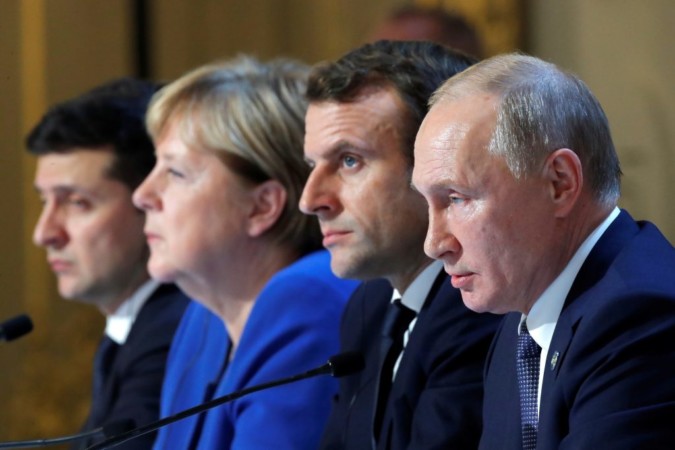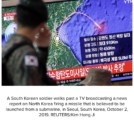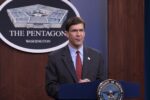Ukraine's President Volodymyr Zelenskyy, German Chancellor Angela Merkel, French President Emmanuel Macron and Russia's President Vladimir Putin attend a joint news conference after a Normandy-format summit in Paris, France December 9, 2019. REUTERS/Charles Platiau/
On December 9, Ukrainian President Volodymyr Zelenskyy met his Russian counterpart Vladimir Putin for the first time during long-awaited peace talks in Paris. This summit was the first gathering of the Normandy Four, which includes French President Emmanuel Macron and German Chancellor Angela Merkel, in over three years. While the meeting failed to produce any major breakthroughs, it did result in progress on a number of technical issues and a commitment to continue the Normandy Four dialogue in spring 2020. What does this mean for the Russia-Ukraine peace process?
John Herbst, Director, Eurasia Center, Atlantic Council:
Paris produced an interesting outcome. The two sides agreed to continue the disengagement process that Zelinskyy and Putin began months ago, along with further prisoner releases and demining. All these steps can be considered positive confidence-building measures. The sides also agreed on implementing a real ceasefire. It is true that incidents of shooting across the ceasefire lines have dropped since late spring. A further drop would surely be a good thing, but there has not been one day without multiple shootings and Moscow has never treated this issue as a priority. Instead, Russia has regarded constant shooting as a way to maintain pressure on Ukraine. It, therefore, remains to be seen whether Moscow will actually implement this latest ceasefire.
Looking ahead, the summit communique says the parties agree to implementing Minsk regarding the special status of the occupied territories and incorporating into Ukrainian legislation the Steinmeier Formula as agreed in the Normandy Four format and the Trilateral Contact Group. It is still not clear what that actually means. For his part, Zelinskyy says he has not crossed any red lines. This means a Ukrainian rejection of the Kremlin’s interpretation of Minsk, which stipulates that elections in the occupied territories take place without the removal of Russian forces and weapons and with the border under Moscow’s control. It may well be that there will be no further elucidation of this point so that both sides can interpret it differently. This and the ceasefire question are the crux of the matter. Even if they remain unresolved, further disengagement, demining, prisoner exchanges and reduced exchange of fire would still represent progress. However, we should not take these things to the bank just yet. If they do materialize, this would suggest Putin is starting to understand his five-and-a-half-year low-intensity war on Ukraine is cutting against Russia and his interests.
Alexander Vershbow, Distinguished Fellow, Scowcroft Center for Strategy and Security, Atlantic Council:
The Normandy Four meeting looks like a modest success for President Zelenskyy. He secured agreement on a series of confidence-building measures (prisoner exchanges, long-term ceasefire, additional disengagement zones, demining) which could reduce the violence and improve the conditions for follow-on negotiations on the many still-unresolved issues. Whether Moscow will implement all these measures remains to be seen. Nevertheless, these agreements came without requiring Zelenskyy to cross any of the red lines he and Ukrainian FM Vadym Prystaiko laid out before the meeting: no changes to the Ukrainian constitution, no federalization of the Ukraine state, no elections before withdrawal of foreign troops and return of the Ukrainian border to Kyiv’s control. Indeed, Zelenskyy was quite forceful at the press conference in holding the line on these points. So fears of “capitulation” proved to be misplaced. The follow-on negotiations will be difficult. Putin did not show any give on the need to stick to the letter of the Minsk agreements, including return of the border only after elections, and he reaffirmed Moscow’s insistence on constitutional changes that would not only make “special status” for the occupied territories permanent but could also weaken the entire Ukrainian state. Another noteworthy aspect of Monday’s summit was Zelenskyy’s poise in addressing the Russian people directly and unfiltered during the press conference, reminding them that he is looking out for Ukrainians displaced from the occupied Donbas and not just those living in the occupied territories. It is too bad the press conference took place when most Russian viewers had already gone to bed.
Michael Bociurkiw, Global Affairs Analyst:
French President Emmanuel Macron’s attempt at diplomatic speed dating left many of us with the feeling of déjà vu, especially the pledge to invoke a ceasefire by the end of the year. As President Zelenskyy pointed out, none of the 20 or so ceasefires declared over the past five years have held. There seemed to be a sense of desperation shared by both Macron and German Chancellor Angela Merkel, as if this could be their last kick at the can on the biggest open wound in Europe. As for the Russian president, Putin was vintage Putin, complete with the trademark swagger, arrogance, and summit-craft honed over the years. His insistence on sticking to the details of the flawed Minsk agreement, which many Ukrainians regard as toxic kool-aid forced upon them, will create challenges on the road ahead and slow the search for peace in the Donbas. No matter what you may think of President Zelenskyy, he came across in Paris as sincere, empathetic and a quick learner. The Ukrainian President demonstrated that he genuinely desires a durable solution for eastern Ukraine that does not compromise Ukrainian sovereignty, brings back control of the Ukrainian-Russian border, and returns detained Ukrainian nationals.
Melinda Haring, Deputy Director, Eurasia Center, Atlantic Council
The headline is this: still green Volodymyr Zelenskyy did not screw up in Paris as many in Ukraine expected, and in fact got several small but important tactical wins out of Vladimir Putin. Both sides committed to implementing a real ceasefire, demining, and releasing more prisoners. However, the two most contentious issues remain unresolved, so nothing earthshattering came out of the marathon summit. The leaders agreed to meet again in four months to discuss control of the Ukrainian-Russian border and elections in the Donbas. To get these tactical wins, Zelenskyy had to agree to extend an unpopular special status law which expires at the end of December that Ukraine’s parliament isn’t eager to renew. Ukrainian society remains deeply divided on special status for the occupied regions and on how to bring peace to the east. Now the hard work for Zelenskyy begins at home.
Adrian Karatnycky, Senior Fellow, Eurasia Center, Atlantic Council:
Although agreement on a major prisoner and detainee exchange is to be welcomed, little was done to move toward ending Russia’s occupation of the Donbas. Nevertheless, the Normandy discussion was an important win for novice diplomat Volodymyr Zelenskyy. Despite a show of nervousness on the world stage, Ukraine’s President spoke clearly, emotively, and convincingly in articulating Ukraine’s positions on the settlement of the conflict. He made clear in compelling terms that there can be no free elections in eastern Ukraine unless all foreign and illegal military formations on the territory are disarmed and unless the border is secured. This position was well articulated and will be hard for anyone to dispute. Just as importantly, President Zelenskyy convincingly argued that the 1.4 million internally displaced residents of the Donbas have a right to be at the table during any peace discussions and must have the right to vote in any post-conflict election scenario. In sum, Zelenskyy defended Ukraine’s interests well in Paris. Although he failed to advance the peace process significantly, he strengthened Ukraine’s positions in further negotiations by demonstrating clearly that Russia’s Putin is both the cause of the conflict and the main obstacle to peace.
Taras Kuzio, Professor, National University of Kyiv Mohyla Academy:
President Zelenskyy receives a mixed report for his first Normandy Four meeting. In response to the strength of Ukrainian public opinion and widespread protests, Zelenskyy adopted a tougher position than many had anticipated. In Paris, he laid down a number of red lines including no federalism (which should mean no “special status” for the so-called DNR and LNR), no recognition of Russian sovereignty over Crimea in exchange for peace in the Donbas, and Ukraine’s right to decide its geopolitical orientation. There will now be another major prisoner exchange (in practice, this means releasing bona fide terrorists and Russian military in exchange for innocent Ukrainians and Crimean Tatars sentenced on trumped-up charges), and the withdrawal of forces from three more places on the contact line. The minuses from Paris include Putin’s unwillingness to discuss withdrawal of foreign forces and equipment, and his refusal to hold elections under Ukrainian law and OSCE supervision. Zelenskyy’s commitment to incorporate the Steinmeier Formula into Ukrainian law will spark bitter opposition from many in Ukraine. Many see this as a step towards achieving Putin’s goal of creating a Russian Trojan Horse in Ukraine by changing Ukraine’s constitution to give “special status” to the occupied regions of eastern Ukraine. Zelenskyy also missed an opportunity when he failed to bring up the very real repression of the Ukrainian language and religion in Crimea and occupied eastern Ukraine in response to Putin’s fake news claims of “infringements against Russian-speakers in Ukraine.”
Alya Shandra, Editor-In-Chief, Euromaidan Press:
The worst-case scenario that many feared did not happen: Zelenskyy did not cross any “red lines”. Moreover, he publicly declared that Ukraine cannot accept the provision of the Minsk accords stipulating that local elections be held in occupied eastern Ukraine before the Ukrainian authorities regain control of the border. Instead, he proposed revising this aspect of the Minsk accords. Zelenskyy recognizes that this clause is impossible for Ukraine to fulfill without betraying the country’s national interests, and the fact that German Chancellor Angela Merkel supported his proposal inspires optimism. However, Putin’s rejection of this idea and his speech remind us of Russia’s own objectives: to legalize its proxy “republics” in the Ukrainian legal system with Ukraine footing the bill, and to foster Ukraine’s internal instability, which would hinder the country’s movement towards the EU and NATO. Leaked emails from Putin’s advisor Vladislav Surkov, who, according to journalists, behaved aggressively during this week’s Normandy Four meeting, leave no doubt that the text of the Minsk accords was specifically crafted to achieve these goals. The Paris meeting underlined that Russia and Ukraine remain far apart in their visions of a post-conflict settlement. Ukraine wants to resolve the conflict and reintegrate Donbas; Russia wants to make the conflict permanent, and thus insists on a verbatim implementation of Minsk in order to enable this outcome. There is no obvious solution to these directly opposed objectives, and that is why we should not have high expectations for an end to the war anytime soon.
Maksym Eristavi, Research Fellow, Eurasia Center, Atlantic Council:
Although not as groundbreaking as those caught up in Europe’s only ongoing war might have liked, the Paris peace talks brought hope to millions suffering from the Russian invasion of Ukraine. Back in Kyiv, there is a lot of political discord over direct peace talks with Russia, but these debates often ignore the fact that according to recent polls, around 75% of Ukrainians support President Zelenskyy’s efforts to engage directly with the Kremlin for the sake of ending the violence. There remains a huge gap between Putin’s promises and his actions. He has lied, misled and betrayed his commitments many times before. I do not, therefore, take anything agreed in Paris this week as a done deal until I see the Kremlin actually following through.
Andreas Umland, Senior Fellow, Institute for Euro-Atlantic Cooperation:
Perhaps the most important development in Paris was President Zelenskyy’s identification of full Ukrainian control over the border as a precondition for the implementation of the now accepted Steinmeier Formula. The second Minsk agreement’s proposition of closing the border only after local elections in the occupied territories was always contentious. It would mean the de facto presence of two competing states while elections took place. This would not have boded well for the vote’s administration, fairness, security, openness and freedom. Something like that was possible in the GDR’s last Volkskammer elections of March 1990 when the soldiers, staff and families of the Soviet Army in Germany, altogether about 500,000 Soviet citizens, were still present in East Germany. At that point, the GDR was not yet fully sovereign and was still formally a member of the Warsaw Pact. However, before the last GDR elections took place, the USSR had abandoned the Brezhnev Doctrine. Moreover, in late 1989 and early 1990, East Germany had experienced a Velvet Revolution as well as partial regime transition, while internal democratization was underway in contemporary Moscow. The circumstances in today’s eastern Ukraine and across the border in Russia are strikingly different. The need to revise the terms for elections in the occupied territories could now lead to a Minsk III agreement. Any new agreement would have to lay out clear sequencing and remove many of the clauses from Minsk I and Minsk II that are now obsolete.
Peter Dickinson is the editor of the UkraineAlert blog at the Eurasia Center and the publisher of Business Ukraine and Lviv Today magazines.
The original article can be found @AtlanticCouncil






Leave a Reply